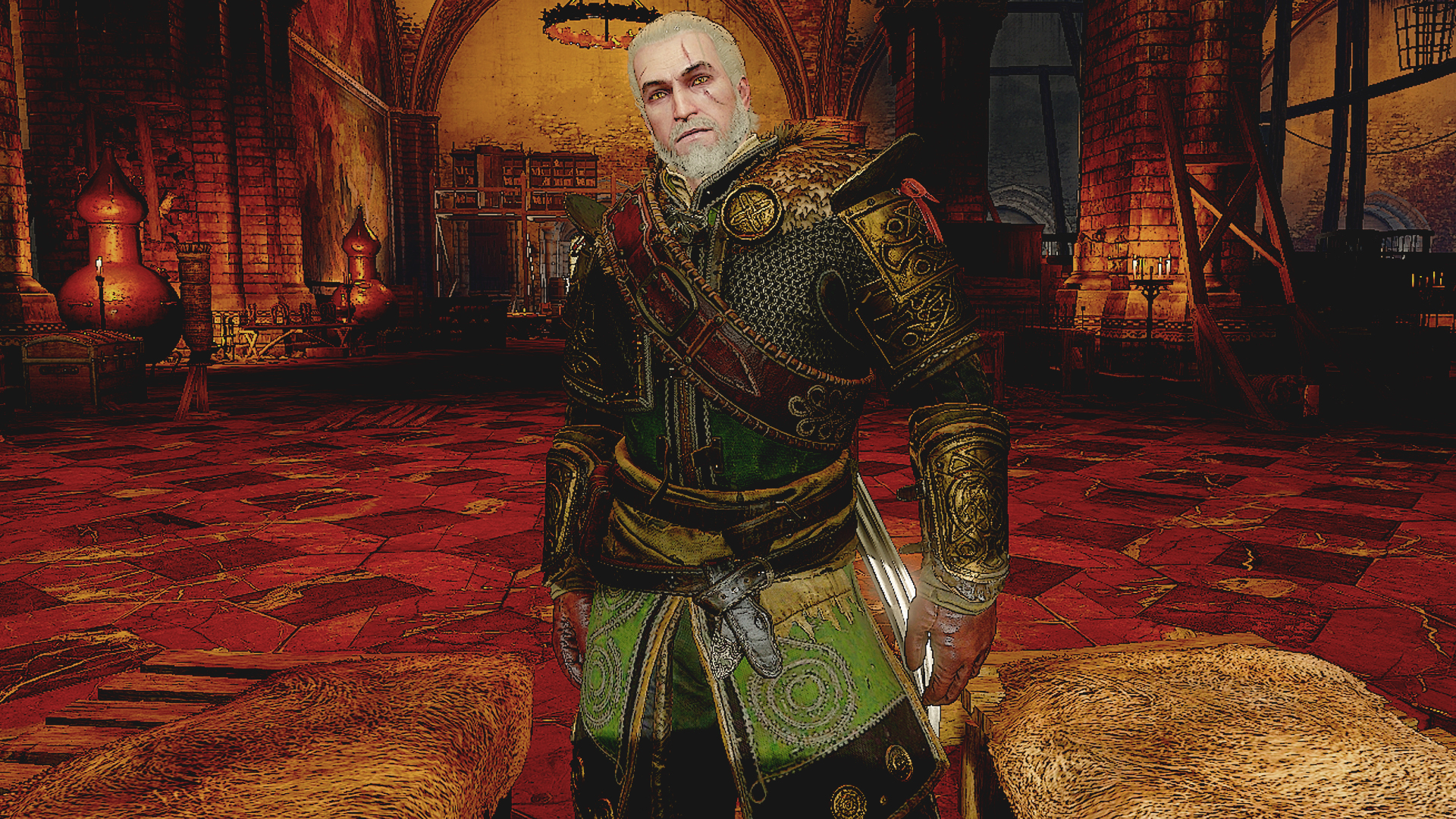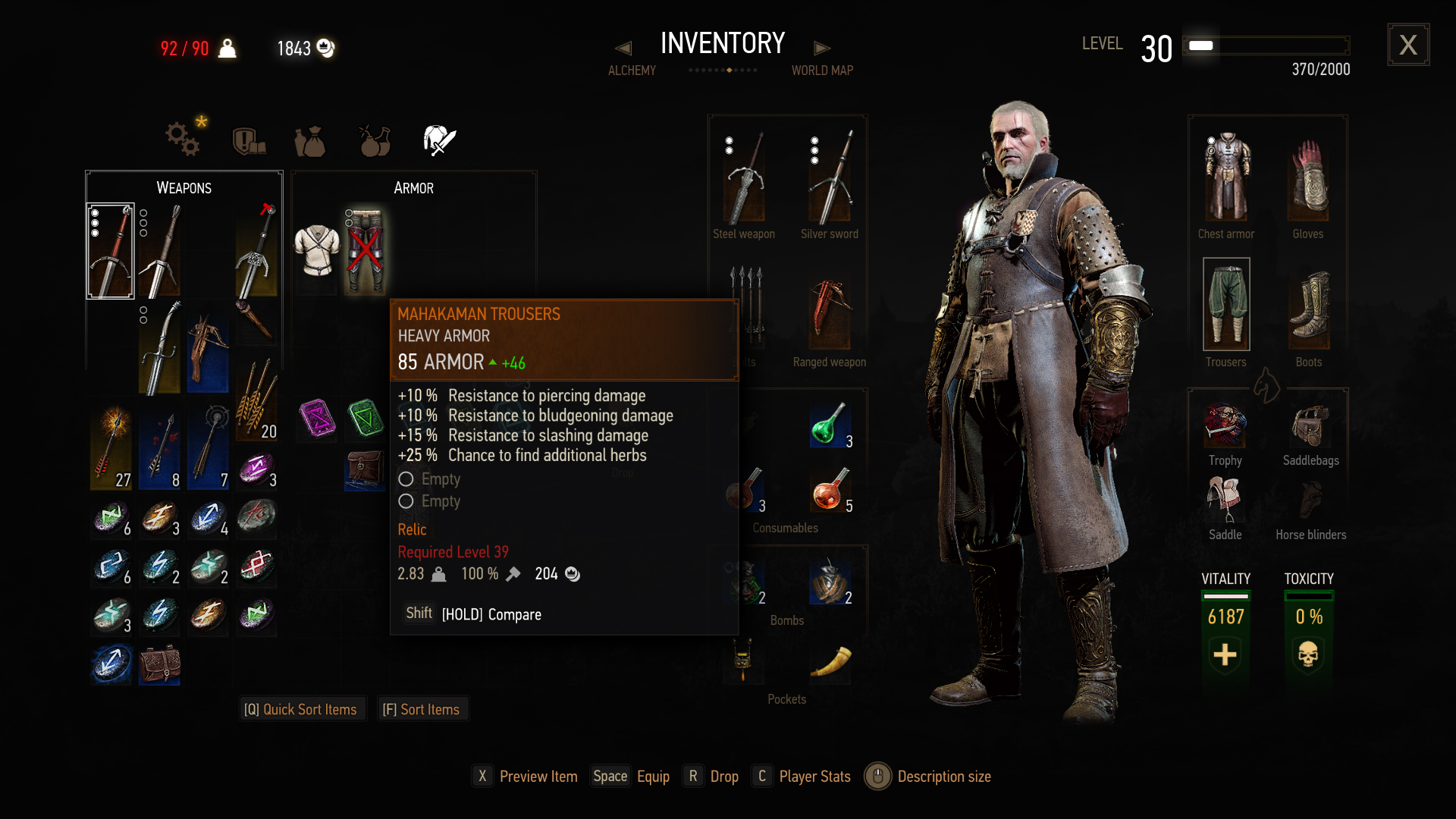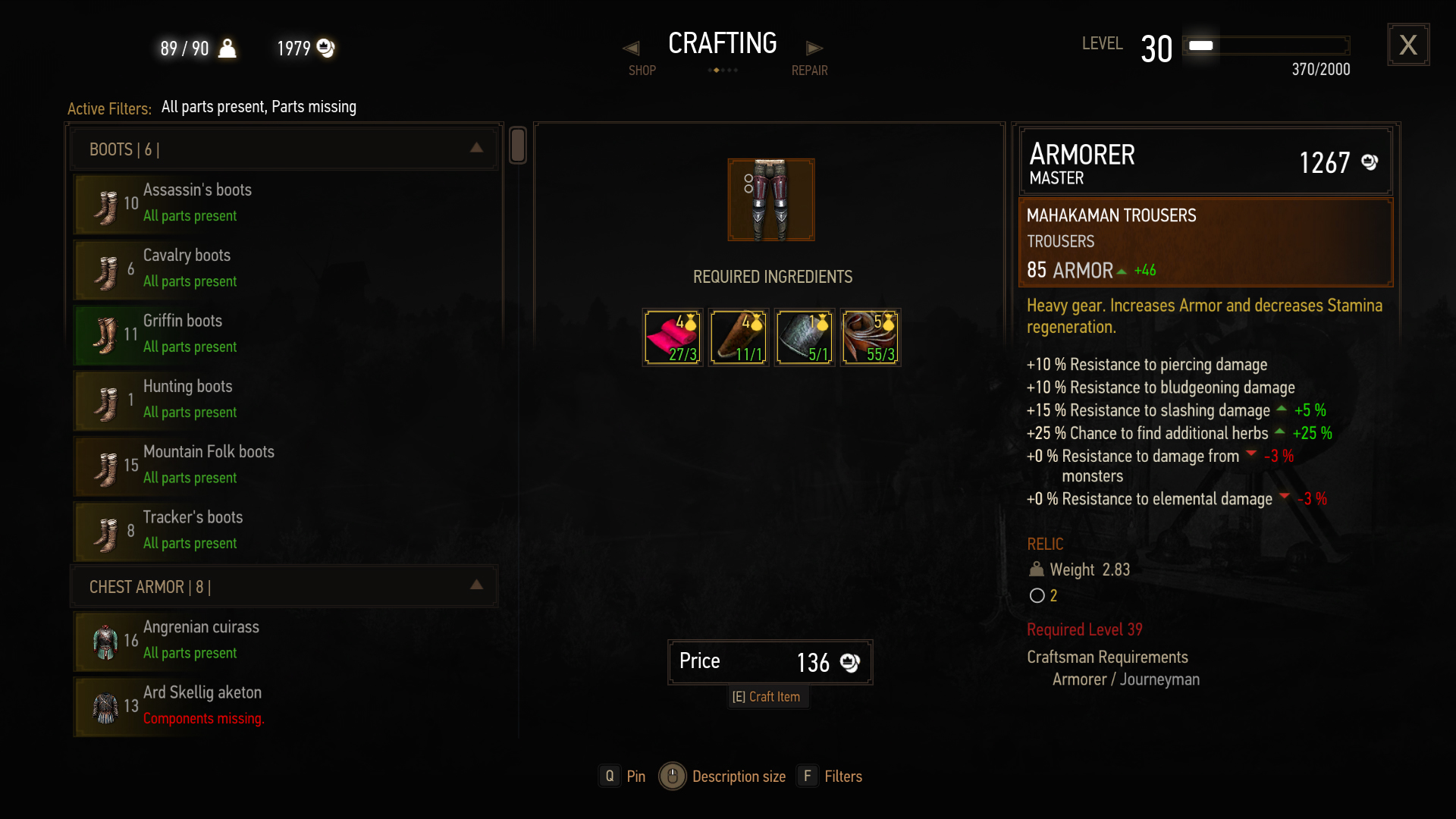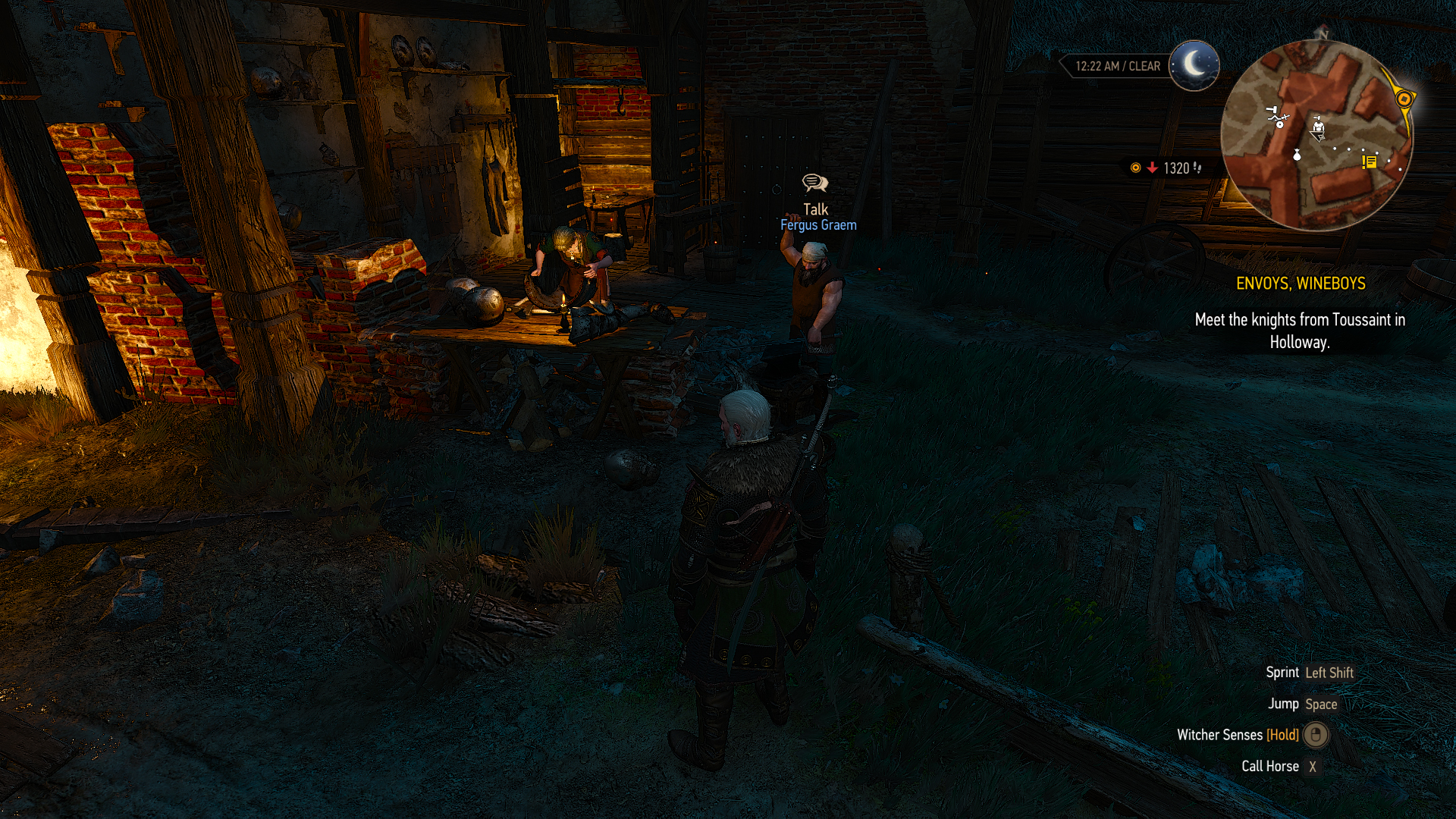The Witcher 3 armor crafting, types and witcher gear explained
There are hundreds of pieces of armor to craft or find but what you should be looking for?

In The Witcher 3, armor is divided into three main categories: Light, Medium, and Heavy across chest, gauntlets, trousers, and boots. Each category has a significant impact on Geralt’s movement, and the preference will vary depending on your playstyle.
Wearing light armor will give Geralt speed to dodge more often without worrying about stamina, but provide less protection. Heavy, obviously does the opposite. Medium gear is the most balanced option overall in terms of mobility and protection, while Witcher gear sets are the most powerful options usually aimed at a particular playstyle.
As with weapons, you’ll have to repair your armor from time to time. Durability can be recovered by paying a fee to an armorer or weaponsmith in The Witcher 3, or by using kits you can find or but from merchants. These are divided into different types as well, varying how successful the repair will be in terms of recovered durability.
There's a lot to take in as literally hundreds of different parts can be mixed and matched, across different categories, sets, and rarity. Not to mention using runes to enhance certain abilities. So it can be daunting to try and manage it all. Here’s our rundown to everything you should keep when kitting out Geralt with the best Witcher 3 armor
Where to find and how to craft armor in The Witcher 3

You can find new Witcher 3 armor littered pretty much anywhere as you explore. Your best bet for looting, however, relies on chests scattered throughout the world, along with some quest rewards. Merchants also tend to have an interesting selection of armor, so you should pay a visit to the nearest armorer in town.
If you want to increase the number of NPCs from which to buy from, make sure to always do contracts that ask Geralt to kill monsters in an infested area. As soon as the job is done, townsfolk will come back to reclaim their homes, and it’s likely that one of them will have something new on sale.
The best gear comes from crafting, but you'll need a diagram. These can be either found or purchased from merchants, which are used as blueprints to unlock the piece on the crafting menu where, you’ll see the item’s description, stats, and needed materials.
Armor crafting materials can be found in the wild as loot found on bodies or in houses, as well as inside chests. You can also dismantle armor and weapons you're not using for a small fee from a blacksmith which is absolutely worth doing - pick up lower level weapons and they can be turned into materials.
How Witcher 3 armor levels and upgrading works

Armor in The Witcher 3 is tied to levels. Find or purchase higher level gear for Geralt and it will be useless until you meet the required level (although you can dismantle it.)
Armor pieces can also be upgraded with runes that increase stats for Geralt as long as the armor has slots for them. Some of them will increase the intensity of Signs, while others are advantages for Geralt’s movement speed, defense, and so on.

Witcher 3 Scavenger hunt sets
The best armor in The Witcher 3 are sets representing a Witcher school. You can find diagrams for these but you must find all the individual pieces to get the set. That's tracked through Scavenger Hunts which are triggered once you find a map or a note talking about the whereabouts of each piece. These specific items can be purchased from merchants to obtain such quests, but can also appear as you’re doing question marks in the map and side quests.
There are six Witcher armor sets to find:
- Griffin Set: Diagrams can be found in Velen.
- Feline Set: Diagrams can be found in Velen and Novigrad.
- Ursine Set: Diagrams can be found in Skellige.
- Wolven Set: Diagrams can be found in Kaer Morhen.
- Viper Set: Part of Hearts of Stone expansion.
- Manticore Set: Part of Blood & Wine expansion.
Upgrading Witcher gear sets

Once you obtain one of the Witcher sets in The Witcher 3, you’ll notice they’re called Basic. This is due to there being different tiers that can be upgraded, from Basic to Enhanced, Superior, Mastercrafted, and Grandmaster. It’s not necessary to have the entire set to start using these armor pieces, but the stats will be much better if you wear it all together.
To unlock Mastercrafted sets, you’ll have to talk with a master armorer. Fergus Graem, located in Crow's Perch, Velen, unlocks the “Master Armorers” quest which is a level 24 mission. Grandmaster gear, on the other hand, is exclusive to Blood & Wine, allowing you to create level 40 versions of each set. Find and talk to Grandmaster Smith in Beauclair to unlock the grandmaster scavenger hunts.
To perform upgrades, you’ll need to find the corresponding diagrams for each tier. It’s also advised to not get rid of the former set since Geralt can’t create an Enhanced set from scratch. So, in order to jump from Basic to Enhanced, for example, you’ll need to have each piece of armor either equipped or on your inventory, plus the required materials and crowns. Keep in mind that while armor sets will get better stats with each tier (and become even more stylish) the cost will be significant.
The Witcher 3 tips | Witcher 3 romance | Witcher 3 side quests and contracts | Witcher 3 ending | Witcher 3 best Gwent cards | Best Witcher 3 mods | Witcher 3 places of power | Witcher 3 side quests | Witcher 3 contracts | Witcher 3 monster killing
Witcher 3 Master of the Arena | Witcher 3 Ladies of the Wood | Witcher 3 Wandering in the Dark | Witcher 3 Following the Thread | Witcher 3 Family Matters
Sign up to the GamesRadar+ Newsletter
Weekly digests, tales from the communities you love, and more

Diego is a freelance journalist from Argentina who learned English thanks to video games. He now primarily covers them for the New York Times, Rolling Stone, Vulture, Polygon, and more. He also founded Into the Spine and co-hosted the Turnabout Breakdown podcast.
- Leon HurleyManaging editor for guides


